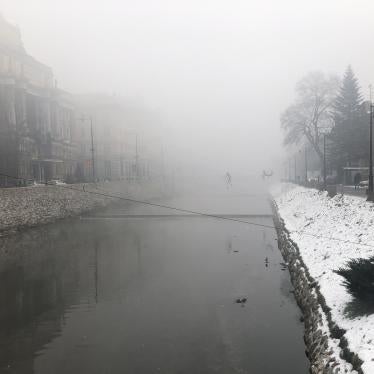Air pollution in Bosnia and Herzegovina’s cities remains some of the worst in the world. In January in Sarajevo, daily readings of the deadliest pollutant (known as particulate matter 2.5) were above 50µg/m³ over 16 days, several times what the World Health Organization (WHO) deems safe. Five days in January saw readings soar over 100 µg/m³. Air pollution at this level makes it difficult to breathe. Even short periods of exposure can lead to eye, throat, and nose irritation. Longer term, these levels can cause very serious health problems.
Bosnia and Herzegovina’s winter air pollution stems from its continued reliance on burning coal and wood for heat, and coal to generate electricity. The country has the fifth-highest mortality rate from air pollution in the world. Every year an estimated 3,300 people in the country die prematurely from air pollution: 9 percent of all deaths. Thousands more live with increased respiratory and cardiovascular conditions. Human Rights Watch has documented how Bosnia and Herzegovina’s toxic air has devastating impacts on its residents’ right to health and life, particularly older people and children.
Globally, burning coal is a major contributor to both climate change, responsible for 20 percent of greenhouse gas emissions, and air pollution that kills an estimated 7 million people globally every year.
While authorities in Bosnia and Herzegovina have taken some steps to reduce air pollution, they are also prolonging the use of coal to produce electricity. In March 2022, the government extended the life of two outdated and highly polluting coal plants, Tuzla 4 and Kakanj 5 until 2028, despite the Energy Community Treaty mandating that these plants close in 2022. The government-owned electricity provider cites energy security concerns as a justification for their continued operation.
In Republika Srpska, the government has yet to cancel a permit for the construction of the Ugljevik 3 coal plant despite a recent court decision to annul the government’s approval of the coal plant’s environmental impact assessment. The decision was due in part to a lack of consultation with interested parties in neighboring countries, particularly Croatia.
People living in Bosnia and Herzegovina shouldn’t have to face yet another winter breathing in deadly air when the country has significant potential for renewable energy. Time for Bosnia and Herzegovina to embrace its clean energy potential and the jobs it can create, and put an end to coal and toxic air forever.









